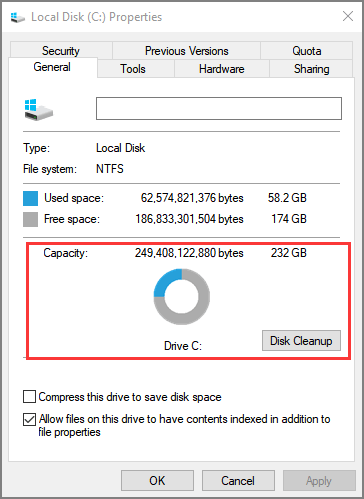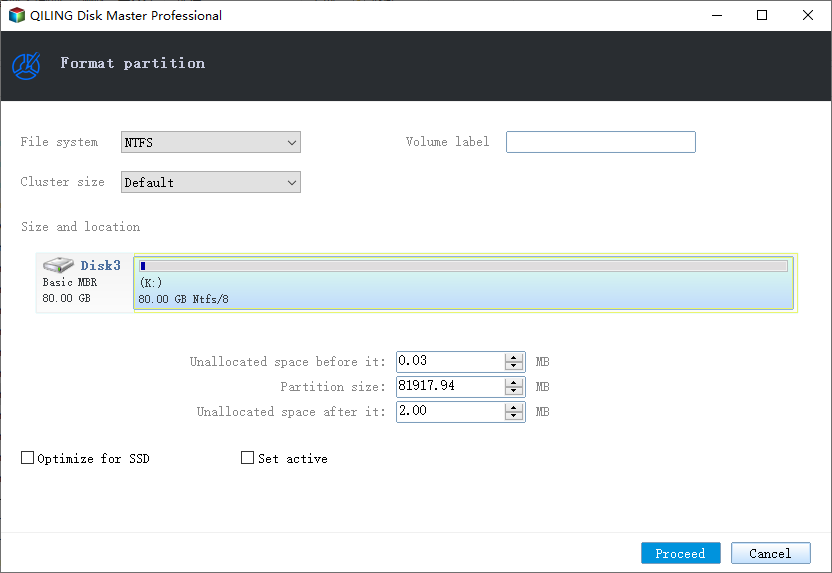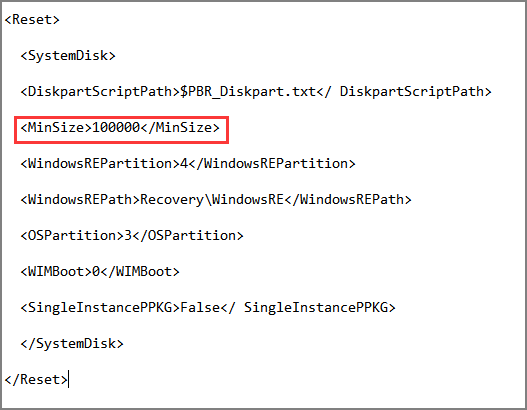Solved 2022: Unable to Recover Your PC. The System is Too Small
"So a few days ago I turned on my PC and it said that the file \WINDOWS\system32\config\system was missing, so I tried recovering my pc via recovery drive. It said wait for a bit and then changed to a screen with the word, 'Unable to recover your PC. The system drive is too small......At the moment I don't know what to do which is why I am going here for help."
If your system gets crashes suddenly, the available method is to use the system image to create a full copy of all data on your computer, including files, system settings, and Windows. What you need to do is to start with the Windows System Image Recovery program. However, recovery may be bogged down by the restoration process. An unfriendly error message may appear "Unable to recover your PC. The system drive is too small." So how to fix the frustrating error? In this article, we will show you some solutions to fix this error.

The Reasons for the "Drive is too small" Error
Before we begin the process of fixing the problem, we can first identify the reason behind the error and find the corresponding method based on the reason.
Start with the reasons, let's see what culprits are causing the error.
- Inadequate disk space: The targeted disk which you want to restore the system image does not have enough space.
- System image issue: The problem exists when you are creating the system. That means you should recreate a system image.
- Hard Disk issue: The existing partition on the hard disk may cause an error to happen. Or your original disk has a conflict with the target disk.
Once you are clear about the reasons, let's move forward to the main part with effective strategies.
Methods to Fix "Unable to recover your pc. The system drive is too small"
Here we gathered 4 fixes to cope with the error.
Option 1. Check Your Disk Capacity
Option 2. Format and Delete Target Disk Volume with Qiling Partition Master
Option 3. Modify Minimum Required Size
Option 4. Recreate A System Image by Control Panel
Option 1. Check Your Disk Capacity
When this error occurs, the easiest way is to check the capacity of your hard drive. You need to make sure that the disk's capacity is larger than or equal to the source disk.
How to check hard disk capacity:
- Right-click the hard drive.
- Select Properties from the drop-down menu.
- Under the General section, you can check your hard drive capacity.

If the option is no good for coping with that error, move to the next solution.
Option 2. Format and Delete Target Disk Volume with Qiling Partition Master
If the disk you want to restore has partitions and an error occurs while restoring the system image, then you should use a tool to format the hard disk. Remember format will delete the data on the target disk.
Formatting a partition means that the data in the partition is formatted, but the partition and drive letter are retained. Deleting a partition means that the volume is directly deleted, the disk letter of the partition is eliminated, and the partition space will become unallocated space.
Qiling Partition Master is a useful software to format, delete, resize, merge partitions in simple clicks. Connect the target disk to your PC and download Qiling Partition Master.
Step 1. Run Qiling Partition Master, right-click the hard drive partition you intend to format and choose "Format".

Step 2. In the new window, set the Partition label, File system (NTFS/FAT32/EXT2/EXT3/EXT4/exFAT), and Cluster size for the partition to be formatted, then click "Proceed".

Step 3. Then you will see a warning window, click "OK" in it to start formatting the partition on your hard drive.
After formatting completed, right-click the volume and click the "Delete..." option.
Option 3. Modify Minimum Required Size
After creating the system image, your minimum required size will be saved on the file named $PBR_ResetConfig.xml.
Open the file and you can see the MinSize which means the minimum size required by the target drive. If the actual capacity of the target drive is less than MinSize, you should edit the value.

How to Edit MinSize: Locate sources > Open $PBR_ResetConfig.xml on Notepad > Reset > System Disk > MinSize
Option 4. Recreate A System Image by Control Panel
Step 1. Type Control Panel on the search box and click to open.
Step 2. Click Backup and Restore and select Create a system image on the left panel.
Step 3. Choose where do you want to save the backup and click Next.
- On a hard disk.
- On one or more DVDs.
- On a network location.

Step 4. Confirm your backup settings and click on the Start backup button.
Wait for the Windows preparing to create backup...
Step 5. Saving the system image.
Extra tip: Recover the computer from a created system image
Step 1. Open Control Panel > Backup and Restore
Step 2. Click Recover system settings or your computer.
Step 3. Under the System Restore section, click Advanced recovery methods.
Step 4. On the next page, click "Use a system image you created earlier to recover your computer".
Step 5. Before restoring the system image, the utility will ask you whether you want to back up your files. If you need to back up your files, click Back up Now. Otherwise, click Skip.
Step 6. Click the Restart button to restart your computer and continue the recovery.
Related Articles
- 5 Ways to Hide Drives in Windows 10 | Check Your In-depth Tutorial
- Free Download SD Card Formatter: All Memory Card Format Software Free Download
- How to Reformat a Hard Drive in Windows 11/10 and Mac [2022 Guide]
- PC Won't Turn on, But Motherboard Light Is on/It's Plugged In